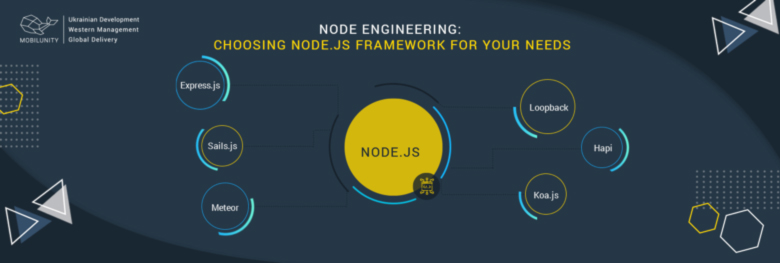5 Reasons to go with Node.js in 2019
Since inception, Node.js has always captured the imagination of developers throughout the world. This is because the platform allows developers to effectively and efficiently build networking tools and web servers in the shortest time possible. Additionally, applications developed using Node.js can be deployed to run on multiple servers including Mac OS X, Microsoft Windows, and Unix. As a result, Node.js developers for hire are in great demand as businesses and web development companies are constantly looking for new specialists who can deliver decent Node.js web apps and more.

What Exactly is Node.js?
Node.js is an open source cross-platform runtime environment that is written using JavaScript. It’s mainly used to build exceptional real-time applications thanks to all its features. As such, it has become the go-to choice for most developers in their web application development projects.
Many big businesses including Trello, Paypal, and Netflix have trusted Node.js web development not only for its scalability capacity but also because of a plethora of other effective solutions.
In fact, according to a 2018 report by Weebly, it's estimated that approximately 0.6% of all the active websites use Node.js. This is a significant portion considering Node has been in existence for less than a decade now. There’s also a number of different frameworks available.

In this article, we are going to look at the top 5 reasons why you should use Node.js development, what is Node.js used for, and even highlight some Node.js examples.
Node.js is Super-fast
As earlier indicated Node.js is a darling to many developers thanks to its versatility. Moreover, it's written in JavaScript and runs on a V8 JavaScript runtime engine which makes the process of running the code much faster. This means that enterprises are able to build flexible network applications which can handle multiple connections with high throughput. For instance, PayPal has been able to double their customer requests per second at the same time decrease the response time with at least 35% courtesy of Node.js applications.
Node.js Facilitates Sharing
Any Node.js developer can attest that Node has some of the best sharing attributes. Courtesy of the Node Package Manager and 50,000 repository packages, the development can readily ride on these two intuitive attributes to build effective solutions.
Another unique selling point of the inbuilt NPM is the fact that it easily allows the developers to refresh, share, and reuse codes without breaking a sweat.
Data Streaming
Data streaming is a paramount aspect of any development project. This is because data streaming at a stable speed frequency to support applications is important when backing up data in the database.
In Node.js, although HTTP (Hypertext Transfer Protocol) requests and responses are real-time data streams, they are treated as isolated events. This allows developers to leverage these data streams to create features such as files processing as they continue to be simultaneously uploaded. At the end of it all, the processing span is significantly reduced which is a plus especially for real-time video and audio encoding.
Works Great for Real-time Applications
Real-time applications help businesses improve operations, throughput, customer service, and reduce costs. This is exactly what Node.js does. It is packed with extraordinary features that come in handy when building real-time applications such as gaming apps and chats.
Node.js also works great for programs that require event-based and non-blocking servers. It shouldn't then come as a surprise that big brands such as Uber, PayPal, LinkedIn, and eBay have all embraced Node web development.
Node.js Help Increase Productivity
Productivity is inversely related to the success of any enterprise. For this reason, productivity can’t be treated as a one-dimensional feature. Instead, it should be treated as a multidimensional approach to be implemented from multiple angles.
One of the most commonly floated misconceptions is that development teams are more productive when using Java as it features compile-time errors.
With Node.js application development, businesses can merge backend and frontend teams into a single unit. This potentially improves productivity at the same time reduce the development span.
Types of Apps to Build with Node.js
As earlier indicated, Node.js technology is renowned for its capacity to process varied events simultaneously. This attribute is particularly important when working with data-intensive projects. Having taken into consideration the benefits and downsides of Node.js, we have compiled a set of specific apps that can seamlessly gel with Node.
Single Page Applications
Today, there are multiple SPAs that come in form of different text, drawing tools, and networking solutions. These types of apps can be augmented using Node.js's asynchronous data flow. Node.js allows for rapid data update without necessarily requiring refresh due to the availability of the event loop.
Real-time Applications
Versatile PM solutions, document sharing, collaborative services, chat tools, and video conferencing are some of the best places to implement RTAs. This is because apps that host all these characteristics risk overloading the servers as they are bombarded with multiple and concurrent I/O operations. Node.js IDE creates a leeway all thanks to the WebSockets and Event API.
Internet of Things
Typically, data transfer in most IoT systems flows from the device through the server before reaching the app. It is at the app level where the final element decodes and relays data to the user. The only problem with such a structure is that the number of similar devices can be overwhelming.
With Node.js, you have the flexibility and capacity to handle a multitude of concurrent requests originating from the multiple devices. With event-driven architecture and asynchronous processing of Node in mind, the runtime environment functions as a shock absorber between the device and the database.
Streaming Apps
The single-most emphatic reason why Node.js is the technology of choice for developing streaming apps is the native Stream API. The feature enables development teams to transmit code sections without discontinuing connection in cases where other components need to be downloaded.
The Take Home
Node.js has irrefutably overhauled the manner in which custom software development and services are conducted by developers. Organizations that have tried this technology can attest to the positive results they have received. Moreover, this is set to improve as perpetual improvements keep on being injected into the platform.

So, if your current platform has persistently continued to run into trouble, it's probably time to take that leap of faith and embrace a Node.js application. Simply conduct an audit of the system and determine whether Node.js can help you seal these apparent loopholes. If yes, take a swipe without a second thought. Who knows, the results may end up surpassing your expectations.




